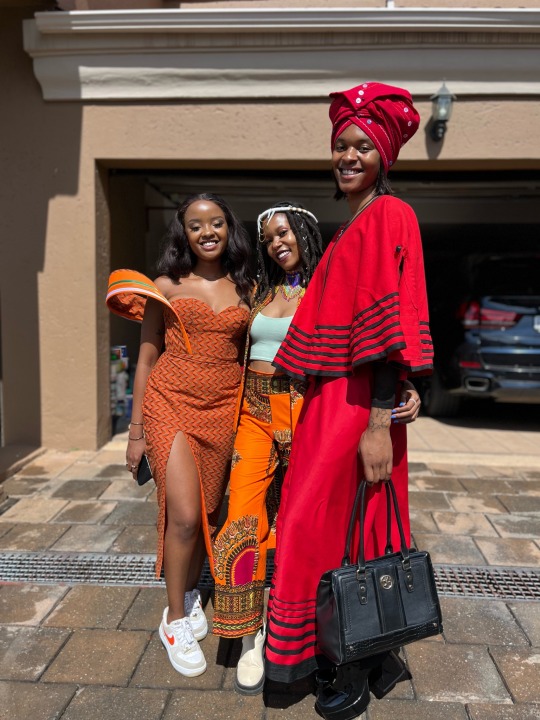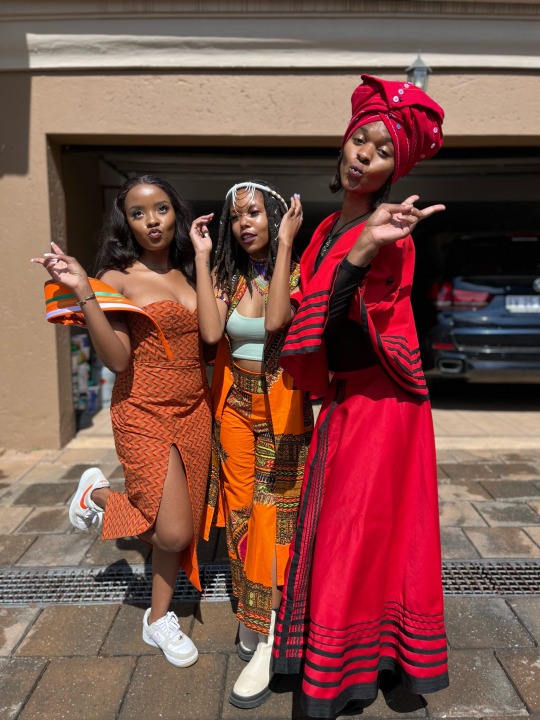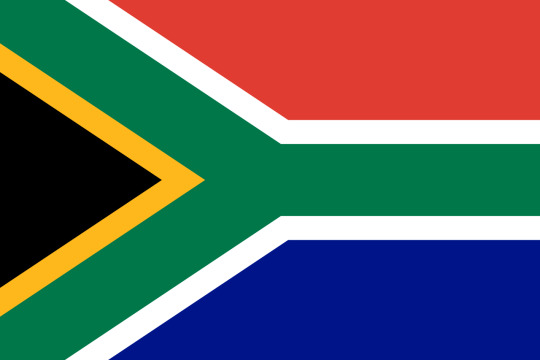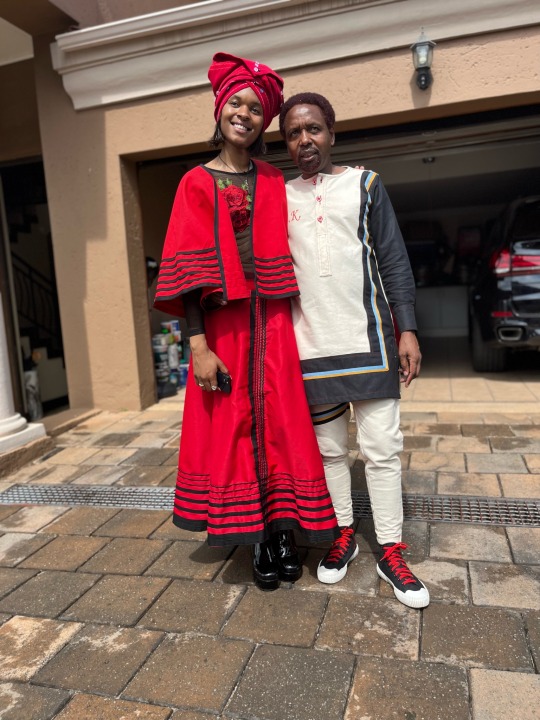#Sepedi
Text



#HappyWomensMonth
#johannesburg#Eastern cape#East London#mdantsane#xhosa#pedi#sepedi#culture#heritage#cultural wedding#wedding#wedding photography#photography#outdoor photography#melanin#black women#black is beautiful#black tumblr#South africa#African women#brown skin#black don't crack
31 notes
·
View notes
Text


#wedding#sepedi attire#Sepedi#Chewa attire#Chewa#Xhosa attire#Xhosa#malawi#South Africa#multicultural#multiculturalism#family fun#family values#colourful#ubuntu#camagu#Thokoza#maRadebe
11 notes
·
View notes
Note
Gammog tha aaaar oga


No clue if you did that on purpose, but if not damn that's a solid coincidence making a almost coherent sentence there

Image search was wild too
8 notes
·
View notes
Text
I don't know if people put intros on langblr but here is mine,
Native: Xitsonga
Also speaks: English
Learning: Kiswahili, Mandarin Chinese
Planning to learn: Sepedi, Spanish, Tshivenda
Interested: Lingala, Igbo, Chishona, Siswati, Makhuwa, French, Portuguese
#langblr#swahili#mandarin#sepedi#spanish#tshivenda#lingala#igbo#chishona#siswati#makhuwa#french#portuguese
11 notes
·
View notes
Photo

Back with another banger on the project ft @no_longer_a_teen18 From f*ck em young to Sphili mpilo 4 more days till the Absolute drops Yall gon enjoy this project as much as I enjoyed making it #youngdn #young_slumpy_dn #sphilimpilo #rihanna #asaprocky #apartheid #singaporegp #sepedi #fifaworldcup #fwc2022 #fifaworldcup2022 #worldcup #poundsterling #dollar #namibia #burna #burnaboy #musa #vinny #unclevinny #idolssa #pardonmyarrogance #lemonslemonade #bigzulu #blxckie #sete #nastyc #kuwe #qoma #blaqdiamond https://www.instagram.com/p/Ci9mbyUtyFF/?igshid=NGJjMDIxMWI=
#youngdn#young_slumpy_dn#sphilimpilo#rihanna#asaprocky#apartheid#singaporegp#sepedi#fifaworldcup#fwc2022#fifaworldcup2022#worldcup#poundsterling#dollar#namibia#burna#burnaboy#musa#vinny#unclevinny#idolssa#pardonmyarrogance#lemonslemonade#bigzulu#blxckie#sete#nastyc#kuwe#qoma#blaqdiamond
0 notes
Text
20 Best Shweshwe Dresses 2024 for South African Women
In 2024, the trend of Shweshwe dresses continues to evolve, with designers pushing the boundaries to create contemporary pieces that honor tradition while appealing to modern tastes. These Shweshwe dresses 2024 are not just about style; they celebrate South African identity and creativity.
Shweshwe dresses have become a cornerstone of South African fashion, blending vibrant colors and intricate…
0 notes
Text
25 Latest Pedi Traditional Dresses Fashion 2024 - Best to Wear
Pedi traditional dresses, integral to South Africa’s vibrant cultural heritage, are celebrated for their elaborate designs and bold colors. Originating from the Pedi people of Limpopo Province, these garments transcend mere clothing; they are a powerful expression of cultural identity, social status, and artistic heritage.
As we progress through 2024, Pedi dresses are undergoing an exciting…
0 notes
Note
Friend, do you have a fun fact in these fridaily times?
Way to get ahead of the game man! Usually, I'm not that awake for a long time before starting work on Fridays, so I don't have time to answer this early in the morning. But today is your lucky Friday, because I woke up at some obscene hour for reasons unknown.
Anyhow! Today You Learned about South Africa's capitals and official languages.

When I was in elementary school, we had a project where each member of the class had to pick a country and do a presentation on it, complete with food. This included the capital and official language. And I when I picked South Africa, I was happy to report that the country I selected had eleven official languages.
Teacher: Well, yes, they have a lot of languages, but what are the official ones? There can only be one or two.
Me: NOPE! They have eleven.
Welp, Wikipedia lists twelve languages, including South African Sign Language, but I'm looking at their constitution and it seems to only list, as I suspected, eleven official languages. (Only eleven. Wow. That's still a lot.)
That's a lot! And according to their constitution, their official languages are!:
The official languages of the Republic are Sepedi, Sesotho, Setswana, siSwati, Tshivenda, Xitsonga, Afrikaans, English, isiNdebele, isiXhosa and isiZulu.
I believe that isiXhosa is the language spoken in Wakanda in the Marvel Cinematic Universe, as the actor playing T'Chaka could speak it. Which is, um, odd, considering that yes, it's an African language, but it's from another part of the continent than Wakanda (admittedly, a fictional country) is supposed to be. It'd be like if a fictional country near Scandanavia spoke Spanish.
Anyhow, South Africa also has three capitals! One for each branch of government: Cape Town, for the legislative branch, Bloemfontein for the judicial branch, and Pretoria for the executive branch!
So now you know.
5 notes
·
View notes
Note
✨ If you get this, answer with 3 random facts about yourself and send it to the last 7 blogs in your notifications, anonymously or not! Let's get to know the person behind the blog ✨
aww my first ask lmaooo 😭😭😭
1.i’m from south africa but my grandparents came here from botswana
2. i speak about 5 languages (english,isizulu,sepedi,setswana,sesotho) and i’m learning spanish for fun rn
3.i’m 5’1 (157cm) which is funny because in south africa it’s the “normal” height for a 19 y/o girl cause everyone is so short but to the rest of world my height is considered very short because you’re all so tall
this was fun even though i forgot everything about myself once i started typing
24 notes
·
View notes
Text


#family#wedding#xhosa attire#xhosa#Sepedi attire#Sepedi#multi cultural#summer fun#father and daughter#me
3 notes
·
View notes
Text
I was given an indigenous overtone flute a few days ago, made of dried kelp, and I'm really struggling to nail down the embouchure. but that's not the most frustrating thing
I was told it's a Venḓa umtshingo. firstly, the Venḓa are from the interior so I'm not sure where they'd historically get kelp from, and secondly, "umtshingo" is the isiMpondo/isiXhosa/isiZulu name for an overtone flute made from reed or bamboo.
now maybe umtshingo is just a generic name for overtone flutes more commonly made from reed, but also including those made from kelp. this seems perfectly reasonable to me (and it's also perfectly believable that they'd simply misremembered that the flute is Venḓa). fine.
searching for southern African kelp flutes online turns up hits for the lekgodilo flute, which looks like a Sesotho word (or Setswana or Sepedi but they, again, don't live by the coast). however looking more closely, every article which mentions the name "lekgodilo" ultimately cites or references the same person : Pedro Espi-Sanchis. the word doesn't seem to turn up anywhere else (although google had been profoundly shit recently so perhaps I'm just not finding them)
here's a video of him demonstrating the instrument :
youtube
he has been published, so maybe he explains where the name comes from. conceivably he could've learnt it via the oral tradition, I guess. but alas, I don't have institutional access
Espi-Sanchis, P. and Bannan, N. "Found Objects in the Musical Practices of Hunter-Gatherers: Implications for the Evolution of Instrumental Music", in N. Bannan (ed.), 2012. Music, Language, and Human Evolution. https://doi.org/10.1093/acprof:osobl/9780199227341.003.0007
there are also a few physical books about ethnomusicology in Southern Africa which will likely have answers. Percival Kirby's in particular. but in the absence of any further digital sources I'm at a brick wall until I can get to the library...
2 notes
·
View notes
Text
hello in every language
Afrikaans: Hallo | Albanian: Përshëndetje | Amharic: ሀሎ(Hālo) | Arabic: مرحبًا (Mrhban) | Armenian: Բարեւ(Barev) | Assamese: নমস্কাৰ | Aymara: Kamisaki | Azerbaijani: Salam | Bambara: aw ni baara | Basque: Kaixo | Belarusian: добры дзень(Dobry dzień) | Bengali: হ্যালো(Hyālō) | Bhojpuri: प्रणाम | Bosnian: Zdravo | Bulgarian: Здравейте(Zdraveĭte) | Catalan: Hola | Cebuano: Hello | Chichewa: Moni | Chinese(Simplified): 你好(Nǐ hǎo) | Chinese(Traditional): 你好(Nǐ hǎo) | Corsican: Bonghjornu | Croatian: zdravo | Czech: Ahoj | Danish: Hej | Dhivehi: އައްސަލާމް ޢަލައިކުމް(assalaam 'alaikum) | Dogri: नमस्कार | Dutch: Hallo | Esperanto: Saluton | Estonian: Tere | Ewe: Hello | Filipino: Kamusta | Finnish: Hei | French: Bonjour | Frisian: Hallo | Galician: Ola | Georgian: გამარჯობა(gamarjoba) | German: Hallo | Greek: Γειά σου(Geiá so) | Guarani: Mba'éichapa | Gujarati: નમસ્તે(Namastē) | Haitian Creole: Bonjou | Hausa: Sannu | Hawaiian: Aloha | Hebrew: שלום | Hindi: नमस्ते(namaste) | Hmong: Nyob zoo | Hungarian: Helló | Icelandic: Halló | Igbo: Nnọọ | Ilocano: Hello | Indonesian: Halo | Irish: Dia dhuit | Italian: Ciao | Japanese: こんにちは(Kon'nichiwa) | Javanese: Halo | Kannada: ನಮಸ್ಕಾರ | Kazakh: Сәлеметсіз бе(Sälemetsiz be) | Khmer: ជំរាបសួរ(chomreabsuor) | Kinyarwanda: Mwaramutse | Konkani: हॅलो |Korean: 안녕하세요(annyeonghaseyo) | Krio: Adu | Kurdish (Kurmanji): Slav |Kurdish ( Sorani) سڵاو | Kyrgyz: Салам(Salam) | Lao: ສະບາຍດີ(sabaidi) | Latin: Salve | Latvian: Sveiki | Lingala: Mbote | Lithuanian: Sveiki | Luganda: Nkulamusizza | Luxembourgish: Hallo | Macedonian: Здраво(Zdravo) | Maithili: नमस्कार | Malagasy: Salama | Malay: Hello | Malayalam: ഹലോ(halayaa) | Maltese: Bongu | Maori: Kia ora | Marathi: नमस्कार(Namaskāra) | Meitelion (Manipuri): ꯍꯦꯜꯂꯣ | Mizo: Chibai | Mongolian: Сайн уу(Sain uu) | Myanmar (Burmese): မင်္ဂလာပါ | Nepali: नमस्कार(Namaskāra) | Norwegian: Hallo | Odia(Oriya): ନମସ୍କାର | Oromo: Akkam | Pashto: سلام | Persian: سلام | Polish: Witam | Portuguese: Olá | Punjabi: ਸਤ ਸ੍ਰੀ ਅਕਾਲ(Sata srī akāla) | Quechua: Allinllachu | Romanian: Buna ziua | Russian: привет(Privet) | Samoan: Talofa | Sanskrit: नमस्ते | Scots Gaelic: Halò | Sepedi: Thobela | Serbian: Здраво(Zdravo) | Sesotho: Lumela | Shona: Mhoro | Sindhi: سلام | Sinhala: ආයුබෝවන්(āyubōvan) | Slovak: Ahoj | Slovenian: zdravo | Somali: Hello | Spanish: Hola | Sundanese: Halo | Swahili: habari | Swedish: Hallå | Tajik: Салом(Salom) | Tamil: வணக்கம்(Vaṇakkam) | Tatar: Сәлам | Telugu: హలో(Halō) | Thai: สวัสดี(S̄wạs̄dī) | Tigrinya: ሰላም | Tsonga: Avuxeni | Turkish: Merhabam | Turkmen: salam | Twi: Hɛlo | Ukrainian: привіт(pryvit) | Urdu: ہیلو | Uyghur: ياخشىمۇسىز | Uzbek: Salom | Vietnamese: Xin chào | Welsh: Helo | Xhosa: Mholo | Yiddish: העלא(hela) | Yoruba: Pẹlẹ o | Zulu: Sawubona
2 notes
·
View notes
Note
https://lingojam.com/DemonicTranslator
It's demonic for "Summon the elder one"

Would you look at that.
Programmers might want to pick something a bit more obscure next time, not that Sepedi is one I knew about in advance, but it shows up on google translate and has about 4 million native speakers.
Should go grab one of those languages that's about to go extinct and use that, make it a fun way for people to keep it alive.
Imagine if instead of nonsense Klingon had been.

SciFi and fantasy writers take note, this is how you make your mark on history even bigger.
Save the world or whatever and a language in the process, if your stuff gets popular enough.
17 notes
·
View notes
Text
Music Video: Makhadzi Entertainment - Bafana feat. Ba Bethe Gashoazen
Makhadzi Entertainment and Ba Bethe Gashoazen reunite once again for their latest hit single, Bafana. Infused with captivating rhythms and a blend of cultural richness, the song draws inspiration from the Tshivenda, Sepedi, and Setswana languages, with “Bafana” meaning “Boys.” Following the success of their collaboration on Makhadzi Entertainment’s debut album and the release of their earlier…
0 notes
